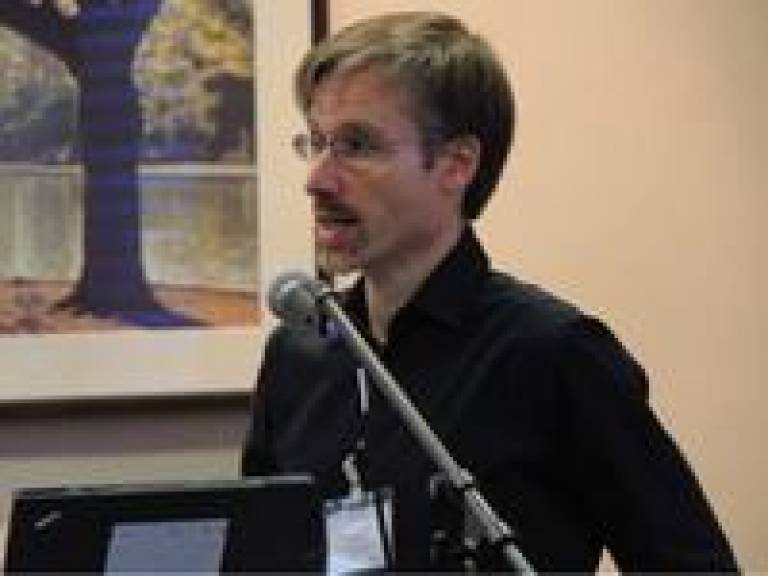Spotlight on Dr Joerg Albert
26 October 2012
This week the spotlight is on Dr Joerg Albert, UCL Ear Institute.

What is your role and what does it involve?
I am a Senior Lecturer at the UCL Ear Institute. The institute is a UCL department, which is committed to basic research into the workings of the senses as well as biomedical exploitations and translations of this research (with particular emphasis on the sense of hearing, obviously). In a nutshell, its core mission is advancing our understanding of hearing and fighting deafness.
Within that, my lab contributes some insights from one of the major model organisms of modern biology - the fruit fly Drosophila. Fruit fly hearing research is what my lab mainly does. But the path to knowledge is hardly ever a straight line and occasionally the wayside flowers are just too beautiful not to take a detour, and so we somehow got into the study of an animal's concept of time, specifically the role that mechanical senses play in the setting of biological (circadian) clocks.
In parallel to all of that, I am a passionate contributor to a number of teaching programmes across UCL.
How long have you been at UCL and what was your previous role?
I joined UCL in January 2008 as a Senior Research Fellow and was promoted to Senior Lecturer in January 2011. Before 2008, I worked as a postdoc at the University of Cologne in Germany and the University of Vienna in Austria, from where I also received my PhD. My university studies took place in Bielefeld and Nuremberg in Germany.
Ever since my early university studies I was interested in, and fascinated by, the mechanical senses (and sensibilities). For my PhD I therefore embarked on a study of nocturnal hunting spiders, which are, from a mechanosensory point of view, perhaps the rightful kings of the animals (well, at least very legitimate heirs to the throne).
However during my postdoc I converted to research in Drosophila as I realised that spiders were perfect for understanding the fundamental questions of mechanosensation but fruit flies were better for answering them. As a result, I have stayed in fruit fly research but retained my passion for spiders (to return one day).
What working achievement or initiative are you most proud of?
Pride is nothing that comes to me easily; I guess one could say that my sense of pride is underdeveloped. The only thing which I could sincerely say that I am proud of is my contribution to a new method of delivering forces by means of electrostatic actuation - this is a small but heart-felt pride. Larger, however, is my sense of enthusiasm for biology and mechanosensory biology in particular, so most of the time I feel very joyful about what I am doing but not exactly proud.
What is your life like outside UCL?
Is that a trick question? When stating it in a newsletter distributed across UCL, it becomes somewhat problematic to still call it 'life outside UCL'!
It seems relevant to say though that my life as a UCL-based scientist takes place at many different places outside of UCL. For example, the collaboration with my friend and colleague Ralf Stanewsky takes me frequently to Queen Mary University. A joint project with colleagues from USA, Belgium and Japan involves, and requires, travelling to different countries. Organising and attending conferences, seminars at other universities, all that is life outside UCL - it's just not life outside science!
Life outside science is an entirely different, if no less tricky, question! Luckily for me, though, there is not so much to declare here. Friends, love and family, new habits and old routines, and from time to time re-reading one's favourite books - just the normal human business.
 Close
Close

